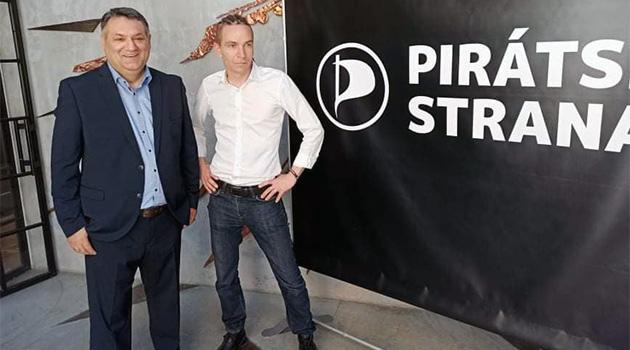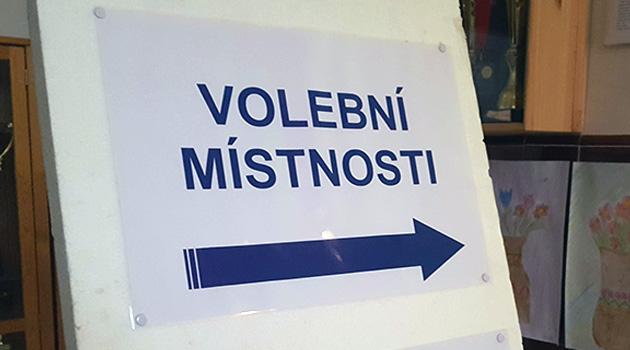Czech Senate election: Romani candidate says right-wing extremists could take power unless people vote for their competitors

This year’s elections for one-third of the seats in the Czech Senate feature a single Romani candidate. Cyril Koky is running in Kolín as the first Romani person to run for the Senate not for an ethnically-profiled party, but for a mainstream party with all of its support – audiovisual advertisements, fliers, banners, etc.
Koky said he will consider it a success if he makes it into the second round. “I can’t guess how many people will turn out or for whom they will cast their votes. We’ll see on Saturday evening,” he said in an interview with news server Romea.cz.
If elected, he wants to focus on laws impacting impoverished families, social housing legislation, construction legislation and the law on collections proceedings. If he wins, he would no longer work for the Central Bohemian Regional Authority and would fully dedicated himself to his job as a senator.
Koky believes that if Romani people do not vote and if they take the opportunity to vote too casually there is a chance that right-wing extremists will be elected at municipal and regional level and could even end up in the central government just because nobody is taking an interest in the elections. “None of us can possibly want Tomio Okamura to become Prime Minister of the Czech Republic, can we?” he asked.
Q: What are your priorities in this election?
A: I am running with a clear vision, for example, of how to communicate with mayors and with the various ministries. I am interested in the issue of small villages, and at the statewide level I will do my best to actively discuss laws that impact impoverished families, which means social housing legislation, construction legislation, and the law on collections proceedings. Last but not least I want to plant the seeds for improving the level of our apprenticeship education and increasing the prestige of such education in society. Each candidate running for the Senate plans to dedicate themselves to the area they comprehend. I would, therefore like to work either in the Senate’s Committee on Territorial Development, Public Administration and the Environment, where I would certainly be able to apply my many years of experience in the state administration, or in the Committee for Health Care and Social Policy. I am of the opinion that in the Senate it is necessary to concentrate especially on the quality of legislation and to carefully assess the possible consequences of the laws on the public.
Q: You are not running just for Romani people, but for all the inhabitants of your precinct, and you have long dedicated yourself to the social arena in your position as an expert official in the field of national minorities. Do you plan, if elected Senator, to continue to take an interest in the area of social exclusion, or in excluded localities?
A: The Senate votes on all the laws that come to it from the Chamber of Deputies. The upper chamber either approves legislation, rejects it, or returns it with draft amendments. A Senator cannot initiate legislation the way an MP can, but he can take initiative on what eventually happens to all of the laws. However, even though I will be reviewing all subjects if elected, and not just the Romani-related ones, I will certainly raise burning problems and focus on them. Personally I am most interested in the law on social housing that is meant to be discussed very soon. It is necessary, however, to say that the Kolín precinct does not grapple with the kinds of problems that are in the Moravian-Silesian or the Ústecký Regions. Our precinct isan agricultural-industrial one and our inhabitants are above all anxious about transportation. For local residents it is important that infrastructre be sufficiently developed, including in small villages.
Q: You mentioned that you will be interested in the law on social housing. How can the trafficking in poverty be combated here?
A: It depends whether the law is adopted or not. At the Czech Regional Development Ministry, subsidy procedures for this have been set up, and some municipalities apply for those subsidies while others do not. In the future it should be established under what conditions such construction can be undertaken and which specific groups of people will be allowed to access the housing. People should be able to afford normal housing and not have to live in those appalling residential hotels. It is necessary to set the rents appropriately so people aren’t paying above-market prices for renting or for residential hotels. I don’t want to carp about it too much, because some people actually have nowhere to live and a residential hotel is their only opportunity to not end up on the street. If we reduce housing benefits, families with children will be unable to pay rent without asking for the housing supplement from the Labor Office. if those supplements are significantly reduced or even abolished, people will end up living underneath bridges, and nobody wants that. Everything has to be thought through, because where will we put the children in that case? What will we do with them? It’s fine to talk about “trafficking in poverty”, but we must first and foremost acknowledge that there is no massive building underway here and quite a few people still live in overpriced residential hotels. Then the state should make sure the residential hotels qualify for housing children.
Q: How can collections proceedings be combated here? I ask because many people would not find it to their advantage to be officially employed, but they work “under the table” because they are subjected to many collections proceedings and they cannot manage to off their debts over time.
A: Collections currently impact more than one million people here, which is no negligible number. The majority society is also grappling with this, in addition to the Roma. Debtors, in many cases, are not subjected to just one collection proceedings, but to more than one simultaneously. I consider it necessary to adopt an amendment to the collections proceedings ordinance and to abolish private collections agents. We Pirates are not interested in seeing a debtor be destroyed by collections, but in seeing that person spared the costs associated with the enforcement of paying the amount owed. It is absolutely unaceptable for people to fall into the debt trap just because of minor debts, a trap from which there is very often no exit. One possible way forward is for a debtor to be assigned to a single collections agent, located near the debtor’s residence, who will administer all of his debts. That amendment has not yet managed to be adopted, so we’ll see what happens next. In any event, this is, again, one of the subjects I consider to be of national importance and interest to me.
Q: What most bothers the Romani community in your precinct?
A: Romani people living in Kolín and the surrounding area face the biggest number of problems with access to housing. There are many applicants and too few apartment units. They have employment opportunities, many of them work in the local automobile industry.
Q: What would you do to increase the credibility of the Senate? Doubts are being expressed as to whether the Senate, as an institution, is actually necessary. Voter turnout for the Senate elections is, on average, lower than turnout for the lower house or for local elections in the Czech Republic.
A: The first elections to the Senate took place in 1996, so whoever wants to can find information about what the Senate has done and is doing. It’s not a “warehouse” for politicians, as it might seem to some. However, it is true that awareness of the Senate’s activities is not very high. It’s up to each Senator to increase its credibility – how Senators communicate with the public, how open they are, how they inform voters about what they do, whether their websites are updated, whether they function on social media, whether they communicate with mayors, etc. In other words, a Senator should act like an ambassador between municipalities, the Regional Authority, the ministries and Parliament. All of that can aid in raising awareness about the Senate as such.
Q: What kind of turnout do you anticipate this year during the Senate elections?
A: According to different polls right now it seems that about 60 % turnout is being predicted. Personally I never believe polls, I myself am curious whether turnout will rise or fall even more this year.
Q: Are you planning to dedicate yourself to the job of Senator full-time, if elected, or will you also continue to work for the Central Bohemian Regional Authority?
A: I’d leave the authority, I can’t do the job of a bureaucrat and a Senator at the same time, it will be either one or the other, full-time.
Q: You are the only Romani person running for the Senate this year. What do you think your chances are?
A: Success would be to make it to the second round. It depends who ultimately gets there. I can’t guess how many people will turn out or for whom they will cast their votes. We’ll see on Saturday evening. In any event my fingers are crossed for my colleagues runing in all the other precincts for the Pirate Party. Our aim is to create a club in the Senate.
Q: Romani people don’t vote much, is there some kind of recipe or tool for changing that fact?
A: It’s not compulsory to vote in the Czech Republic, nobody can force you to cast a ballot. That’s generally known, it’s the personal responsibility of each one of us. If we are too casual about this, then it could very well happen that right-wing extremists will be elected in the municipalities, the Regional Authorities, and that they would even sit in the central government just because nobody took an interested in the elections. None of us can possibly want Tomio Okamura to become Prime Minister of the Czech Republic, can we?
Q: What is your view of xenophobic election slogans against Romani people?
A: If political parties and politicians are unable to capture voters’ attention in any other way, if they degrade themselves by using derogatory slogans, that’s pathetic.
Q: What is your view of vote-buying? Can this be restricted at all?
A: My view is that it is felony. Political parties that abuse the social situations of impoverished people to buy their votes deserve no mercy.
Q: Romani candidates are not succeeding in running for office in the Czech Republic compared to the Roma in Slovakia. How do you explain that?
A: The Romani population of Slovakia is much larger than in the Czech Republic. The lion’s share of that success is above all due to Slovak Prime Minister Igor Matovič and his OLaNO Movement, without his support such success would have been very difficult to achieve.
Q: Has the ongoing COVID pandemic influenced your campaign?
A: Right at the end we had to adapt the campaign to the Government’s new measures. From the turnout for our rallies it could be seen that people are afraid and turning out much less. On the other hand, people in quarantine do have the opportunity vote – under stricter conditions, but they are able to.
